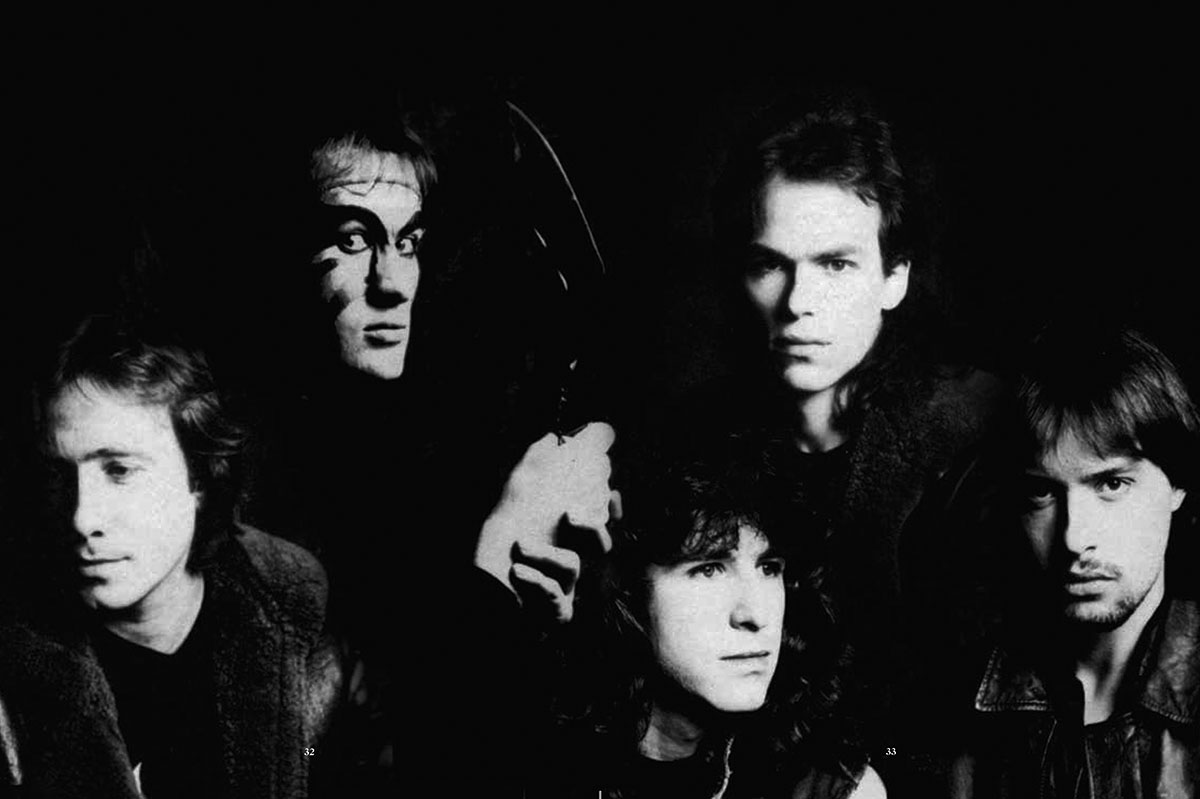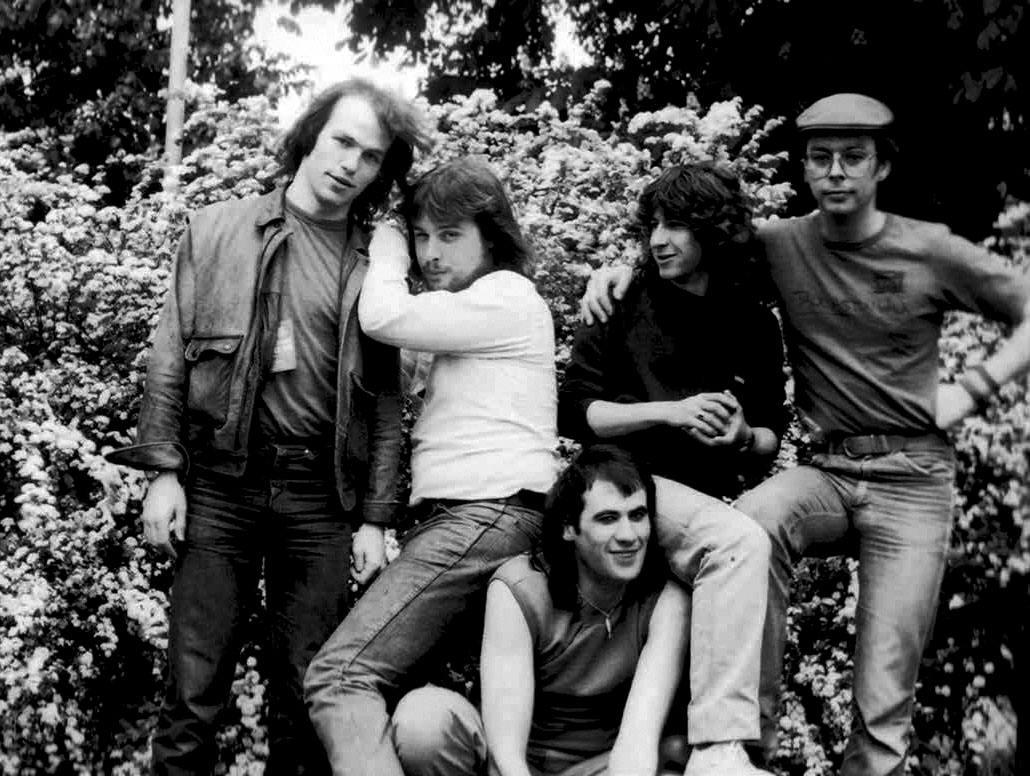The weary jester lies alone, disrobed and sprawled across a hotel bed on a night that has too soon become morning. Evidence of meaningless trysts and the indulgences of his lifestyle lay strewn about him. Real and imagined objects pepper the room and crimson elixir spills like lifeblood from the glass he can barely maintain his grip on. Far from the squalid bedsit where we last saw him, his surroundings are now plush and bright, in stark contrast to his obvious internal anguish. Was this art imitating life for Marillion?

The young band was going places. They’d amassed a monster cult following in their short existence, but the pressure of following up their revered debut album Script For A Jester’s Tear had reared its head. Bands often found themselves whisked into a studio and tasked with quickly creating a whole new album from scratch, after having all the time in the world to come up with the first one. Coupled with the usual pressure to make sure it had a hit single (or preferably two), this is known in the biz as Second Album Syndrome. But while some artists falter under the pressure, others manage to channel that energy into greatness. And so it went in 1984, when Marillion delivered their sophomore LP, the dark and moody Fugazi, to a rabid and growing fan base.
Fugazi is a good record, but could probably do with a remixing - Nick Tauber, producer
Recorded in multiple studios, the problematic sessions became rushed, ran well over budget, and resulted in a final mix that precisely nobody was happy with. On paper, it was almost as though Marillion were trying to avoid success. The album was often brooding, complex, and wordy, with no obvious hit single, and it thumbed its nose at every current musical trend. But to their fanatical following, they could do no wrong – and they didn’t. Fugazi moved beyond its painful birth, proving a darkly charming and sometimes thrilling album from a band on the cusp of the meteoric rise that would all but engulf them only a year later.

Fast-forward through 37 more years of band history to Parlophone’s latest entry in the ongoing series of deluxe Marillion reissues, and the final instalment of the Fish era. Spanning the four discs are hi-res stereo and 5.1 surround mixes, b-sides and demo tracks from the period, a complete live show from the tour, nearly two hours of new interviews with the band, and a live video from Swiss TV. A companion 60-page book is packed with photos, lyrics and a history of the album’s creation. For the wax collectors, a separate 4-LP vinyl boxed set is also available.
The album cover is close… but it was actually a bit grubbier. There were too many chemicals around for the good of everyone - Fish
Modern remixes are a tricky business, and up for public scrutiny in a big way, no matter who is behind the control desk. With such passionate and critical fans, I’m not sure remixing Marillion albums is a task I’d relish. Truthfully, some titles in this series have been brilliant… others more flawed (I felt Clutching At Straws lost some of its power, whereas Script improved by leaps and bounds). But even improvements have to pass muster with fans who have decades of experience with the originals. No matter how cool that little guitar lick or that new vocal effect sounds to some listeners, others will question whether those things should be restored after all these years of being buried… even if the the new way is how the band originally intended it.
So where does the sound of this new mix rank in the grand scheme of the band’s recent reissues? Fairly high… safely in the top third, anyway. Drums and bass guitar have a lot more punch. Fish’s vocals are less in-your-face in some spots, bringing a touch more balance to the overall spectrum (this is noticeable straight away in the long, mystical opening to Assassing). Key melodic leads from Steve Rothery and Mark Kelly are treated delicately and seem largely unchanged, if perhaps pushed forward on occasion for maximum emotional impact. There’s a sparkling clarity to some tracks that really open them up, both in stereo and surround. The album was never one of the better sounding in the Marillion catalogue, and stood a lot to gain from having fresh air breathed into its nostrils (as did Script, remixed by the same duo, Andy Bradfield and Avril Mackintosh). I cranked the volume to dangerous, neighbour-angering levels for the middle section of Emerald Lies, the clattering drums crisply slicing through my living room and the creepy vocals landing with a newfound intensity… and there was much rejoicing.
As it should be, there aren’t a lot of drastic changes, but I want to address a couple of points about the title track: the removal of four seconds of silence after the piano and vocal intro was jarring. I know it matches how it was performed live, but on the album, it just doesn’t seem right to have the guitar suddenly leading into the next section without the dramatic pause I’m so used to. The track’s finale now comes to a full stop instead of fading out, which I suppose brings its own new sense of drama. This change was one that I warmed to the more I listened, but on the whole, I prefer the original mix for this particular track… which brings me to another point. One feature I feel is lacking here is the inclusion of the original mix, not only for A/B comparisons (for those so inclined), but simply to have both available in one complete package, thus enabling people to sell off their old versions. Some volumes have this feature, this one does not, and it’s unclear why that hasn’t become a standard.

A major draw, though, is a complete live concert recording from June 1984 at the Spectrum in Montréal. Much like the bands they are too often compared to, Marillion were really a powerful live act, and their renditions of these songs, to be frank, mop the floor with their comparatively tame studio counterparts (this has been the case all through their career, as it is with most live bands). Incubus is a true classic, one of the best tracks from the Fish years, and this version’s a cracker. Of course, many of us know it already, as it’s one of the three tracks from the band’s first live release Real To Reel taken from this very concert. But it’s nice to finally have the full show as an official release, and the sound is vibrant and spectacular. The band fire on all cylinders, performing almost the entire Fugazi album (swapping out the dirge-like She Chameleon for the superior Cinderella Search, as the album should have done), all but one track from Script, a rousing rendition of Charting The Single and an epic Market Square Heroes to the elated Montréal crowd. A triumphant live set, to be sure. If that wasn’t enough, a cracking 50-minute appearance on Swiss TV that same year (including a pre-show interview) is added, and this time it’s video footage (lest we be denied Pete Trewavas’ bouncing mane in all its resplendent glory).
I said: What happened with Jonathan, your last drummer? And Fish said: Oh, well he was American… and that’s all he said! - Ian Mosley
Finally, there’s an extensive documentary titled The Performance Has Just Begun, consisting of new interviews with all five band members reminiscing (with sometimes eye-opening honesty) about the album’s creation and the period in general. A recurring theme is the huge leap forward the band took with the arrival of Ian Mosley following the rapid-fire rotation of previous drummers Andy Ward, John Marter, and Jonathan Mover. Everyone is in firm agreement that Mosley was the missing puzzle piece they needed at that moment in time, and in comparing with earlier live or studio recordings, there’s no doubt that they are right, he really did propel them to the next level. It’s interesting to consider that from this point on, there would only ever be one more lineup change in Marillion’s long history.
The documentary (and its shorter companion The Story Of The Songs – a track-by-track analysis by each band member) is an engaging watch, and although one cringes at the alarming number of times cocaine is mentioned, there are many fascinating new anecdotes and tidbits revealed. I certainly didn’t know that Mark Kelly played the Fugazi intro on the same piano that Freddie Mercury played Bohemian Rhapsody on, for example. But no more spoilers! Suffice to say, for people who enjoy behind-the-scenes tales and revelations, this documentary is brimming with them, and the band seem to retain a surprising fondness for a lot of the music.
It’s hard for me to imagine my life without this album, and I don’t want to. The way these thick melodies weaved their way permanently into my memory, and the emotional impact the lyrics had on me as a young man (who romanticized the same things Fish seemed to) can’t be overstated. So my praise of this new version of my beloved album is not given lightly, and my recommendation is sincere. I’ve been over it with a fine-toothed comb, and while I don’t consider it entirely flawless, it’s still a richly rewarding trip down memory lane… one that I didn’t realize I needed until those songs began bouncing around the room, and it all came flooding back in an instant. And for a while, it helped me forget that this world is totally fugazi.
Reproduced by kind permission of Lorne Murphy and Velvet Thunder. See Lorne's original review here.
< back


